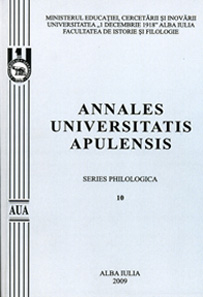Employing Cooperative Strategies In Learning Professional English at University Level
Employing Cooperative Strategies In Learning Professional English at University Level
Author(s): Alexandra E. JacobsenSubject(s): Foreign languages learning
Published by: Universitatea »1 Decembrie 1918« Alba Iulia
Keywords: joint learning; communication skills; professional group; intuitive beliefs; reflective beliefs
Summary/Abstract: This papers aims at investigating means of increasing the efficiency of a university course in professional English, so as to enhance its usefulness for the students and, consequently, its relevance to their future careers. In doing so, the paper draws on the author’s own experience in teaching professional English at Bachelor level for students of Applied Electronics. Taking into account the specificity of the students’ field of study, such a course seeks to make use of their experience in two ways. On the one hand, it attempts to employ learning methods and techniques which are already familiar to the students, such as, for example, project work and team work. On the other, it attempts to address topics specific to their area of study, i.e. computer applications. Basically, it employs CLIL methodology (Content and Language Integrated Learning), which, although relatively recently coined as such, has been common practice in the Humanities for a (very) long time, i.e. learning language through studying literature, various texts, etc. An important aspect of this methodology is the use of authentic materials in learning language, which in this particular case is provided, on the one hand, by the Internet, which functions as a key source of information about and instructions on computer applications, and, on the other, by various technical manuals. Besides improving the students’ language competence, this course has as its main objective to improve the students’ communicative skills in areas which will benefit their future professional careers both as regards their interactions with professionals as well as non-professionals. An important feature in this respect, i.e. in developing students’ presentation skills, is learning how to take the audience into account, that is, how to adjust their communication to the knowledge and expectations of the audience. What all this boils down to, in fact, is understanding the frames with which the audience is familiar, i.e. the ways that different people conceptualize the world, and without which communication is doomed to fail. Moreover, it is often forgotten that learning itself – to a great extend – presupposes the understanding of such frames, and in particular the assumptions associated with them. Therefore, an additional aim of a course in professional language/ communication would be to attempt to sensitize students to these differences.
Journal: Annales Universitatis Apulensis. Series Philologica
- Issue Year: 11/2010
- Issue No: 2
- Page Range: 300-315
- Page Count: 15
- Language: English

